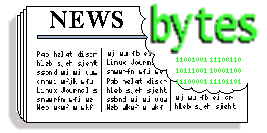News Bytes

|
Contents: |
Submitters, send your News Bytes items in
PLAIN TEXT
format. Other formats may be rejected without reading. You have been
warned! A one- or two-paragraph summary plus URL gets you a better
announcement than an entire press release. Submit items to
bytes@linuxgazette.net
Legislation and More Legislation
 DMCA
DMCA
As reported some time ago, Lexmark has been attempting to use the DMCA to prevent other manufacturers from producing compatible ink cartridges for Lexmark printers. Essentially, the DMCA comes into this business due to the inclusion of electronic protections into the actual cartridges. To produce a replacement cartridge a manufacturer must, obviously, circumvent this technological protection: an action that exposes them to potential attack under the DMCA.
The Register has reported that on October 26th the US Courts of Appeals, Sixth Circuit, has overturned an earlier decision and will allow SCC to continue to sell replacement cartridges pending the final resolution of the case. The Electronic Frontier Foundation has an online archive of documents relevant to the case.
 e-Voting
e-Voting
Well, this is a time when voting is on everybody's mind (not just in the US). It will be interesting to see how the disparate voting and vote-counting systems in use across the States perform and their relative robustness. Of course, many informed observers in the technology community, and in particular the FOSS community, recognise the importance of having open standards and verifiable methodologies in e-voting systems. The Register reports that US manufacturers are inching towards appearing to provide the kind of verifiability and accountability required from systems at the heart of democratic infrastructure. I recommend you read the article yourself to see how far short of an adequate solution the companies' suggestions fall.
Linux Links
OSDir.com takes a look at KDE's desktop network protocol handlers.
Steve Ballmer says Windows is better than Linux
An interview with Linus Torvalds at Linux Times.
ATT&T considers move to Linux.
LWN has a nice article on the Linux OOM (Out Of Memory) handling mechanism. Also interesting (in a humorous way) from LWN is a quick analysis of the presence of swear words in Linux source code.
A team at Reykjavik University has implemented a complete kernel level run-time support for C++ in the Linux kernel.
O'Reilly has an analysis of the recent malware RedHat-hoax email that has been circulating, and what this might mean for the future of GNU/Linux security. There is a longer analysis at NewsForge.
Wired has written an account of the ascendancy of Free and Open Source Software in Brazil, and how this relates to broader social traditions and trends in this huge nation.
News in General
 Linux Focus
Linux Focus
Linux Focus, an online GNU/Linux magazine that we have linked-to regularly in the past, has made a few changes in their publishing style. From now on, the magazine will switch from its bimonthly publishing schedule to a new continuous publishing model. So now you've even more reason to take a regular look at this fine publication.
 Linux Kernel
Linux Kernel
The latest release of the Linux kernel, version 2.6.9, was released on October 18.
Distro News
 Kanotix
Kanotix
Distrowatch has a review of the Debian/Knoppix-based lived-CD Kanotix: KANOTIX - Putting the Pizzazz on Debian.
 SuSE
SuSE
SuSE Linux Professional 9.2 has been released. You can read a review at GeekTime Linux, or see the release discussed at Slashdot.
It was also highlighted on Slashdot that SuSE and Dell are extending their partnerships to provide GNU/Linux platforms to customers. Also of interest in this context is the Dell Linux blog.
OSNews has reviewed the SuSE Linux 9.2 LiveCD.
 Ubuntu
Ubuntu
Ubuntu Linux is a new Linux distribution based on the architecture of Debian. The aim is to have a new release every six months, and in this way to continuously have an up-to-date stable distribution. This distribution is aimed particularly at desktop users.
Ubuntu can be downloaded for free, or alternatively you can order free CD-ROMS.
 Vector
Vector
Mad Penguin has reviewed VectorLinux 4.3, a Slackware-derived distribution that aims to make the most of older hardware.
Software and Product News
 Mozilla
Mozilla
The Mozilla project has released the first release-candidate of the Firefox browser. This marks another step towards the imminent release of the long-awaited version 1.0. Another component in the run-up to this release has been a campaign to place a full-page advertisement in the New York Times. This effort turned into a stunning success, and over 10 days 10,000 people collectively donated $250,000. The Spread Firefox website has more information on the efforts being made to give the Firefox launch as much coverage as possible.
Mick is LG's News Bytes Editor.
![[Picture]](../gx/2002/tagbio/conry.jpg) Born some time ago in Ireland, Michael is currently working
as a lecturer in the Department of Mechanical Engineering, University
College Dublin. The topic of his PhD research was the use of Lamb
waves in nondestructive testing. GNU/Linux has been very useful in
this work, and Michael has a strong interest in applying free
software solutions to other problems in engineering.
Born some time ago in Ireland, Michael is currently working
as a lecturer in the Department of Mechanical Engineering, University
College Dublin. The topic of his PhD research was the use of Lamb
waves in nondestructive testing. GNU/Linux has been very useful in
this work, and Michael has a strong interest in applying free
software solutions to other problems in engineering.

